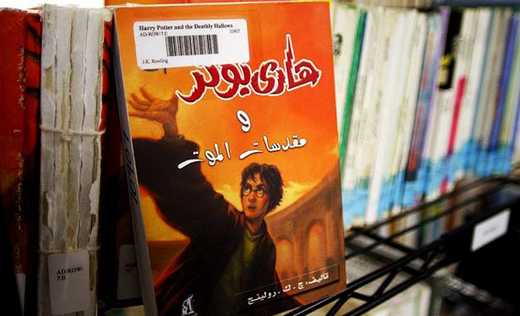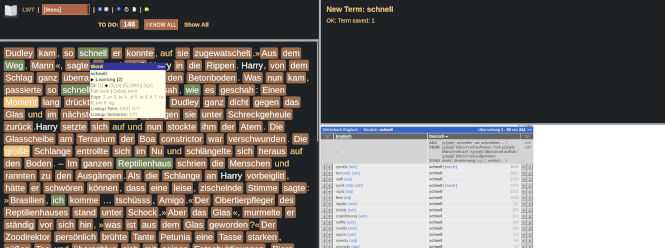The Simplest Way To Learn Languages Using Harry Potter Translations
 Written byHubert Nagel
Written byHubert Nagel- Read time6 mins
- Comments10

UPDATE: The easiest way to get the Harry Potter books in many different languages is to click here and select a language on the left sidebar (or use the search bar).
EDIT: A few of my readers have brought to my attention that the University of Calgary has only provided the first two paragraphs at the link below.
I admit I’ve never been a follower of the Harry Potter series.
The movies are amazing but I just never took the time to get into the books.
That being said, Harry Potter is arguably the most famous children’s fantasy series written in modern times and it currently has over 70 foreign language translations.
Seventy languages!
I’ve actually seen articles stating over 80 but it seems to be a contested number. Either way, it’s a huge number.

This, along with the fact that it’s written for a younger audience, makes Harry Potter an exceptional literary resource for any aspiring polyglot.
Children’s books like Harry Potter are perfect for adult learners
As someone who recently published a fiction series for low-level Arabic learners (see here), I know a thing or two about this topic.
The problem with attempting to read adult content as a language learner is that it’s usually written for educated, adult native speakers. It’s often filled with slang (in the case of fiction) or formal language (in the case of news media).
This means that the level is totally inappropriate for you as a learner.
But children’s books (or books aimed at adolescents) tend to contain simpler vocabulary and expressions.
Harry Potter is perfect for this.
Even in English, the book is enjoyed by millions of adults around the world even though it’s a children’s series.
This means it’s written at a low language level while at the same time being interesting for adults.
Enjoyment is key in successful learning outcomes.
Comparing Harry Potter and Tolkien for language learning
Not too long ago, I reviewed the Irish (Gaeilge) translation of Tolkien’s The Hobbit (called An Hobad).
Unlike Harry Potter, I’m a diehard Tolkien fan.
Also, reading about the Shire and Tolkien lore in Irish actually made the story more authentic and real to me.
I had the opportunity when I was doing language immersion in Ireland to chat with some translators about both Tolkien and Harry Potter (which has also been translated into the Irish language).
One of the things they told me is that the Tolkien translations are generally much better than Harry Potter translations.
This is has to do with a lot of the concepts used by J. K. Rowling that just don’t translate well into other languages.
I found this really fascinating.
In case you’re not familiar with how translators work, one of the biggest challenges for fiction translators is conveying made-up terms and concepts found in fantasy.
While Tolkien also has a tonne of this kind of language, the translators I spoke to told me that his work is a lot more ‘transferable’.
So the finished the translations of Tolkien’s works may be nicer to read than Harry Potter translations.
Of course, I can’t directly verify this claim but I would love to hear from you if you’ve read both books in a translated edition!
Harry Potter language samples from the University of Calgary
Now here’s a very handy language resource that’s freely available online thanks to a few good folks over at the University of Calgary, Alberta.
From MarketWatch [UPDATE: This link is no longer available]:
On November 25, the University of Calgary’s Language Research Centre will launch a one-of-a-kind online collection of audio readings from all 70 translations of Harry Potter and the Philosopher’s Stone, the first novel in J.K. Rowling’s Harry Potter series.
The multilingual collection of readings was created as a resource for students and teachers of language, but is expected to appeal to anyone who is interested in language or is a Harry Potter enthusiast.
The audio library of all 70 translations of Harry Potter and the Philosopher’s Stone can be found here on the University of Calgary website.
Whether or not you’re into Harry Potter (I’m not really), children’s books are an excellent tool to use when learning languages.
The reason for this is that when we’re starting out, we are on the same if not lower level than kids are in our speaking and comprehension.
My very first Arabic book was a Kermit the Frog alphabet book written in colloquial Egyptian!
Check out the Harry Potter audio readings at the link above, listen to small bits over and over, and try to grab an English copy so you can follow along with it.
Learning With Texts + Pottermore for reading Harry Potter in foreign languages
I’ve talked a lot about Learning With Texts (LWT) before.
It’s basically a free, open source version of LingQ (not free) which is an assisted reader that helps you learn vocabulary.
Basically, you add the text you want to read and an audio file (if you have it), then you go through the text and mark words or phrases as you learn them. It’s insanely useful.
Pottermore is an online store where you can download the digital version of any translated version of Harry Potter for less than $9 (here’s the Arabic one for example).
Using LWT in combination with a digital Harry Potter translation will enable you to read along and add words as you learn them.
Follow my directions for installing LWT here.
Or if that’s too technical for you, sign up at LingQ and add the Harry Potter text there.
Harry Potter Arabic translation audiobooks are now being released on Storytel
Fans have been waiting a long time for the Arabic audiobooks of Harry Potter.
Well the wait is over (almost).
Samaan Ferizali, a famous Arabic voice actor, has been at work on the series which is exclusively available through Storytel.
So you can now download the audio for Harry Potter Arabic and add this to LWT or LingQ to read along with the digital Arabic version.
What about other audio language editions?
They’re mostly available on Amazon and Pottermore but you’ll have to search around.
If you know of other specific languages that are not available on Amazon, please leave a comment below so I can add links to the resources.
Using Harry Potter texts with LWT to learn the target language
It’s super straightforward.
Learning With Texts allows you to input the text you’re reading which will display on the page like this:

As you can see, the text is displayed with individual words highlighted different colors.
These colors indicate how well a word is known – in this case, the words with no color (e.g. Harry, und) have been ignored or marked as well-known), the yellow represents knowing the word extremely well, the green means slightly known, the brown – not known.
Normally, LWT is plain white but I’ve colored mine.
When you click on a word in the Harry Potter text, the translation pops up in the bottom-right window.
Super easy!
You can then export these words to a flashcard program like Anki for memorization and practice later on.
This works for all languages (in this case, I’ve shown you German).
If you add the MP3 file of the Harry Potter book you’re reading, it’ll show an audio player about the text so you can follow along.
See my post about installing LWT here.
 Grab the link to this article
Grab the link to this article